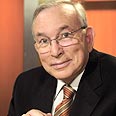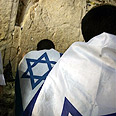
Yaron London
Photo: Yonatan Davis

Celebrating Jerusalem Day
Photo: AP
Jerusalem Day, which we celebrated Monday, marks the “miracle” of the Six-Day War, where Jordan’s King Hussein deviated from his customary great caution and attacked western Jerusalem. He did not intend to occupy it, but rather, to appease the Egyptians who pressed him to go to battle along with them.
At first, the Israeli government hesitated to take advantage of the opportunity to atone for the loss of the Jewish quarter in the War of Independence. “What do we need this Vatican for?” asked Defense Minister Moshe Dayan. Meanwhile, then-President Zalman Shazar predicted that if we take over the Holy Sites, we can expect an eternal war with the Muslim world.
It is doubtful whether the conflict between Jews and Arabs would have been shortened had the government heeded the warnings of its realistic ministers, yet it is clear that the city’s future is one of the obstacles to resolving our relationship with the Arab world. Had we not taken over Jerusalem, it would have remained of marginal value in the imagination of Muslims – yet from the moment Jews took control of the entire city, “al-Quds” has become the heart of the fire.
Moreover, the annexation of east Jerusalem weakened the city rather than deepening our control over it. Jerusalem Day is an official production aimed at concealing this grim fact, yet only about half the people buy it. This is the half that believes that God is preoccupied with matters of real estate and finds it of great importance to boost the size of His offices.
Yet according to all the criteria used to assess power and control, the capital is weakening consistently and rapidly. First, demographic realities are favoring the Arabs. When we took over Jerusalem, they made up about 20% of the city’s population, yet by now they comprise almost 40% of it. Should they decide to realize the voting rights they’ve been granted, we shall have an Arab mayor in a few years. And so, just when the Jews are controlling the city, they are losing the demographic advantage they’ve been enjoying starting in the mid 19th Century.
Capital among Israel’s poorest cities
Secondly, indirectly the annexation encouraged a demographic change in relation to secular Jews and ultra-Orthodox Jews. Soon, seculars will comprise only about a quarter of the city’s Jewish population. The main reason for it is differences in birthrates, accompanied by the departure of wealthy seculars from the city.This process accelerates itself and makes our capital among the poorest Israeli cities. The city’s façade conceals its poverty, because it highlights the luxurious public construction, the immense transportation projects, and the hugely expensive vacation homes of wealthy Jews from the Diaspora.
Thirdly, the friction between Jews and Arabs did not create a framework of coexistence, but rather, radicalized the hostility. The blatant discrimination against Arabs and the violent defense means employed vis-à-vis their rising hatred ridicule slogans such as “the connected city” or “the city of peace.”
The large-scale annexation, the demographic structure of the capital’s population, and the escalation of conflict within it prompt global voices that call for a solution via international administration of the city. The gradual recognition of our ownership of part of the city has been eroded because of our urge to claim all of it and triple its territory.
The chances of dividing the city decline, while the price of such separation skyrockets, because we created settlement buffers within Arab neighborhoods. The propaganda ads on television won’t change the capital’s situation and won’t change demographic, economic, and political realities that outline the grim future of Israel’s capital.















